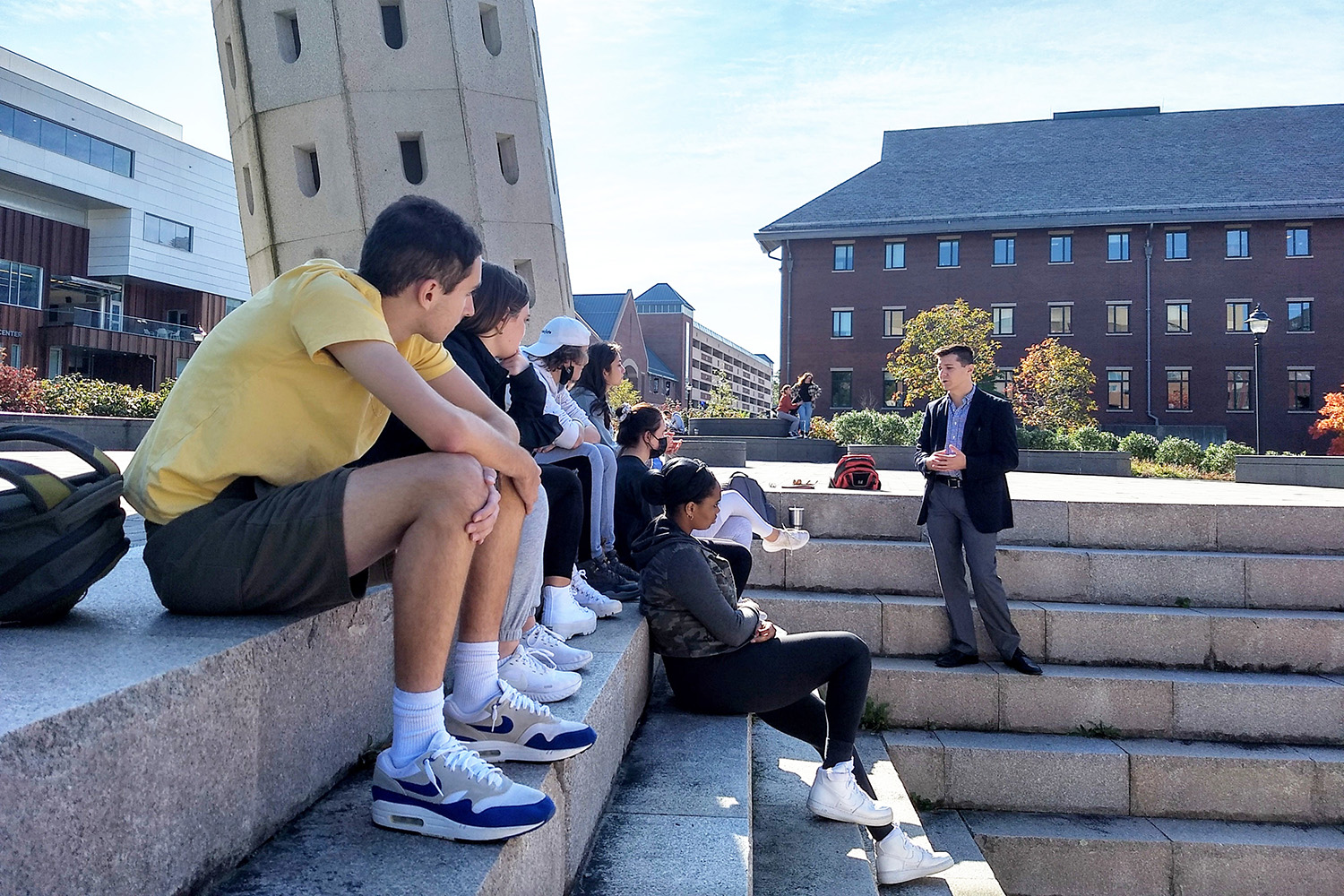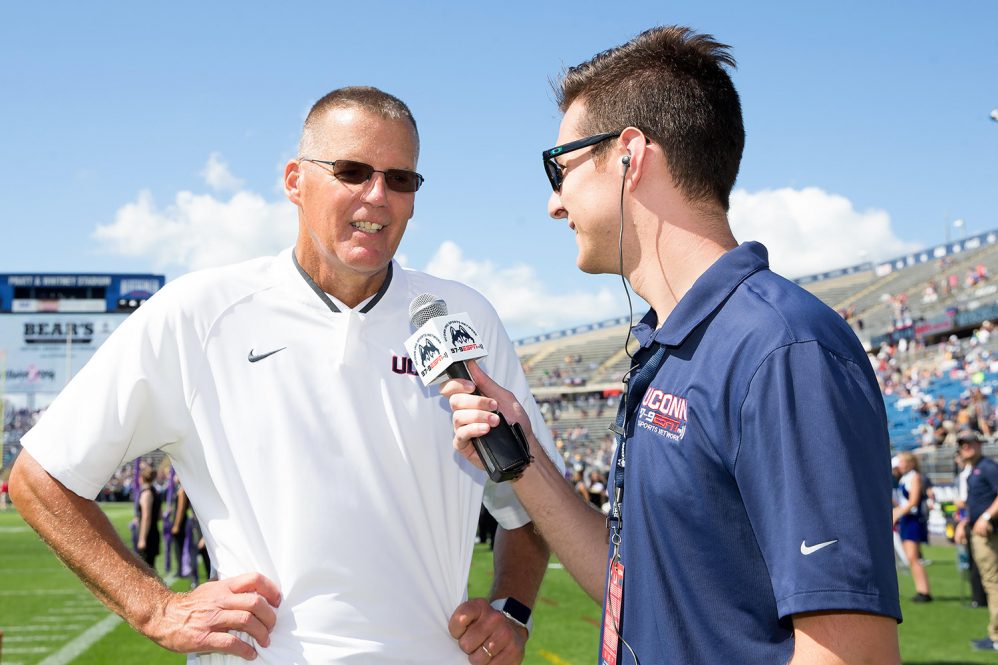Adam Giardino ’11 (CLAS) came to UConn with the goal of pursuing a career in sports. It wasn’t until he got in front of the microphone at WHUS that he found his calling in broadcasting. While working in the profession, he found another passion pushing for social change in the broadcast booth. The journalism and communication alumnus discusses how he started the Black Play-by-Play Broadcaster Grant & Scholarship Fund in the wake of George Floyd’s death, and how he continues to chase his big league dreams at UConn.
Tell us a little bit about yourself and your career.
I’m someone who always knew what they wanted to do for work. The first time I called a game for WHUS a week into my freshman year, I knew play-by-play was for me. A decade in, my career has been really rewarding. I’ve been able to do a lot, and I’ve already seen avenues where I’ll be able to accomplish things outside of broadcasting. Being able to start the Black Play-by-Play Broadcaster Grant & Scholarship Fund, being able to work with middle school and high school students at sports broadcasting camps – that is rewarding to me. Broadcasting is entertainment. People need entertainment. But at this stage of my career, I’m someone who’s found a lot of joy in being able to help other people who want to pursue this career.
Can you describe the Black Play-by-Play Broadcaster Grant and Scholarship Fund and what motivated you to start it?
It all goes back to the reckoning that our nation faced at the time of George Floyd’s murder. Going to rallies and protests was one thing, but I wanted to do something tangible as well. I had conversations with colleagues when women started integrating into Minor League Baseball broadcast booths. I realized this is a great step, but there’s more that needs to be done. My initial thought was to raise $3,000 for a one-time grant for aspiring Black broadcasters entering the field. Because of all the money that was raised, I ended up filing paperwork with the IRS and creating a nonprofit. It’s reaffirming to know the idea is supported by so many people, even those outside of broadcasting.
What was the most important skill you learned at UConn?
Writing. Learning how to write journalistically versus writing in a typical English course is so different. In broadcasting and journalism, the key phrase is “word economy”; the fewer words you use to convey the point, the better off you are, and I am always mindful of that in my day-to-day life.
Another part of my UConn experience was being a resident assistant in Northwest. I like working with people and helping people generally, and I learned that it is invaluable to just ask how someone is. You don’t know what someone’s going through until you ask them. In my career, when I talk to people and athletes, I feel like I’m able to connect and build relationships in a sincere way, as a result of what I had to do with my 40 residents when I was an RA.
Is there a professor who helped push you to get where you are today?
I took a course with journalism instructor Steven Kalb in the basement of Jorgensen Auditorium. We learned about teleprompters and how to use a green screen. He talked about how I had a‘“vocal instrument” and how to use my voice to my advantage. He worked with me and helped with my range and pacing – how to speak faster and slower to make things sound more interesting. It’s a decade later, and I can absolutely still remember that.

After graduation you took a job with the Lakewood BlueClaws, and continued on to Trenton Thunder and Scranton Wilkes-Barre Rail-Riders, a Triple-A affiliate of the New York Yankees. Talk about that transition from the classroom to the field.
My job with the Lakewood BlueClaws was the first time I took a post-graduation step into the broadcasting world. I hit my stride at that point. Everything that I had done at UConn put me in a position, at 21 years old, to move five hours from home to New Jersey and spend January through September working in Minor League Baseball.
In Trenton, I got to move up to Director of Broadcasting. I was 23 years old as the No. 1 broadcaster for the New York Yankees organization. It was a big responsibility.
Getting to Triple-A with the Rail Riders was awesome. In my third year, I was named Minor League Executive of the Year. That award really speaks to the impact that the nonprofit had and will have in the future for the diversification of broadcast booths.
You have also worked as a broadcaster for colleges, including UConn, covering games for outlets like ESPN+ and the Big East Digital Network. What is that like?
Based on the experience I had at UConn and WHUS as an undergrad, I fell in love with college athletics, and I knew I wanted to call college football and college basketball. When I was a student, I wrote a senior capstone thesis about my career ambition to someday be the voice of UConn Athletics, doing radio play-by-play for football and men’s basketball. When you get an opportunity like that, you get woven into the fabric of an amazing community like UConn.
What would you say to a student that hopes to sit in your position one day?
Get to know people in the industry and be genuinely inquisitive. I don’t think we give people enough credit. Most are willing to talk and help young professionals. You may feel like you have nothing to give them, but you can overcome that fear the more people you reach out to. You’ll be surprised at how many people are willing to give some of their time to others.



